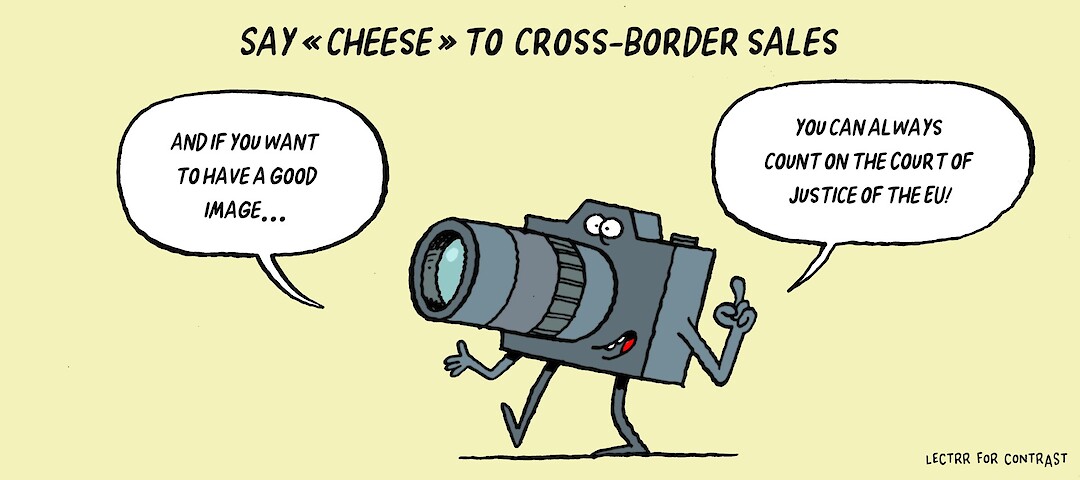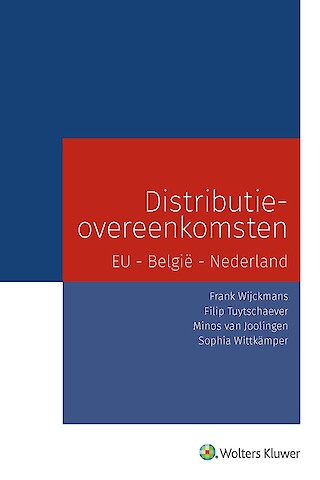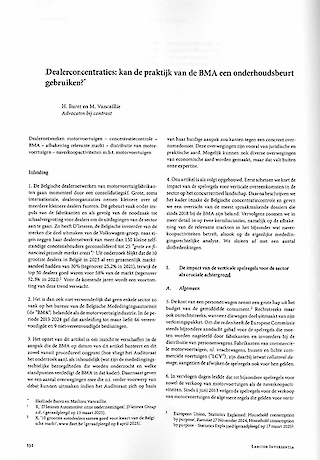In the Picture

Say 'cheese' to cross-border sales
June 2025Imagine...
You are a Dutch producer of cheeses and sell your cheeses in the Netherlands to supermarkets and wholesalers. You don't know much about the Belgian market, so you make an importer exclusively responsible for selling your cheeses in Belgium.
When one of your Dutch clients opens supermarkets in Belgium and sells the cheeses purchased from you in those supermarkets, the importer is unpleasantly surprised. Since he is exclusively appointed, he believes that you should protect him against the sales of your Dutch customer. You are sympathetic to this argument, so you send an e-mail to your Dutch client with the friendly request to contact the Belgian importer for the cheeses that the client wants to sell in Belgium.
The Dutch client is anything but happy with this: he can buy the cheeses cheaper from you and he wants to use that price advantage in Belgium. Moreover, he believes that you violate competition law if you prohibit him from selling the cheeses purchased in the Netherlands in his Belgian supermarkets. If you want to enforce such a ban on him, you must impose it on all your other customers first.
You are shocked by this reaction. Earlier, you had heard from your in-house counsel that you can protect an exclusive importer from active sales. What do those other customers have to do with that? Should you then also prohibit your Greek customer, for example, from actively selling in Belgium, even if it is not preparing to enter the Belgian market?
A brief clarification.
European competition law supports the European Union's ambition to create a single market. Agreements between companies to partition the single market are viewed with suspicion.
For the relationship between a supplier and its buyers, the rules of the game can be found in the Block Exemption Regulation for vertical agreements, Regulation 2022/720, and in guidelines that accompany this regulation, the Vertical Guidelines. If you follow those rules, you can sleep soundly. If you don't, you'd better brace yourself for a heated discussion if you want to impose sales restrictions on your buyers.
Under Regulation 2022/720, any restriction that you, as a supplier, impose on your buyers in terms of the territory where they are allowed to sell is, in principle, a violation of the rules of the game. You lose the benefit of the Block Exemption Regulation, and the Vertical Guidelines make it clear that it is unlikely that you will be able to enforce your sales restriction.
There are exceptions to this principle: for example, you can protect an exclusively appointed buyer against active sales from your other buyers. This is true even in the case of shared exclusivity (up to 5 buyers per territory or customer group). It is even possible to demand that your buyers in their turn impose such an active sales ban on their own direct customers. The latter is referred to as the passing-on possibility. The idea is that this limited territorial protection should be sufficient to encourage the exclusive buyer(s) to invest in the supplier's products.
This logic only applies if the supplier imposes such an active sales ban on each of its direct customers. This is referred to as the requirement of parallel imposition.
In a recent judgment in a case brought by the importer Beevers Kaas against supermarket chain Albert Heijn, the Court of Justice of the EU clarified that the requirement of parallel imposition is an integral part of the definition of exclusive distribution in Regulation 2022/720.
Thus, if that requirement is not met, the supplier cannot require any of its buyers to comply with a prohibition on active sales. It is only once the requirement is fulfilled that the prohibition on active sales can be enforced by the supplier for the future, not for the past.
Thus, an exclusive buyer is only protected from active sales in its territory from the moment that all other buyers of the supplier in the EU have accepted a prohibition on active sales to territories where the supplier has appointed the exclusive buyer. That acceptance does not necessarily have to be proven by a written agreement. It may be implicit and follow, for example, from the actual observance of the prohibition. However, as the Court emphasizes several times in its recent judgment, the supplier must first have sent a specific and explicit invitation to its buyers to comply with the prohibition, so that their attitude can only be interpreted as consent to the request. The supplier must be able to provide proof of this.
Our Dutch supplier of cheeses will therefore have to agree with all its buyers in the EU on a ban on active sales to Belgium (or more generally to territories where it has appointed an exclusive buyer), explicitly or implicitly, through general terms and conditions that are tacitly accepted or a specific explicit invitation that is respected. Only then can the Dutch buyer also be held to a ban on active sales. If he also accepted the ban of course ...
Concretely.
Following the judgment of the Court of Justice in Beevers Kaas, the protection of exclusive buyers can be summarised as follows:
- A ban on active sales is only legally valid and can therefore only be enforced if, as soon as and for as long as it has been imposed on every buyer in the EU.
- If a supplier has done this properly, it can protect an exclusive buyer (importer, wholesaler or retailer) from active sales from its other buyers in the EU.
- There is a passing-on possibility of the ban on active sales to the direct customers of those other buyers, if the supplier so provides. The supplier cannot go any further.
- The protection against active sales applies both to exclusive buyers and to shared exclusive buyers, up to 5 per territory.
- The size of the territory can be freely agreed by the supplier with the buyer(s) concerned. A ban on active sales can apply not only to a territory, but also to a customer group.
- Passive sales must always be allowed: an exclusive or shared exclusive buyers must allow sales in its territory or to its customer group by other buyers if the initiative for that sale comes from the customer, not from the other buyer.
Want to know more?
- Regulation 2022/720 can be found here
- The Vertical Guidelines can be found here
- The judgment of the Court of Justice of the EU in Beevers Kaas can be found here
- More information can be found in "Vertical Agreements in EU Competition Law", the 4th edition of which was recently published by Oxford University Press.
Please consult our website or contact one of our team members if you have questions or require more information:













